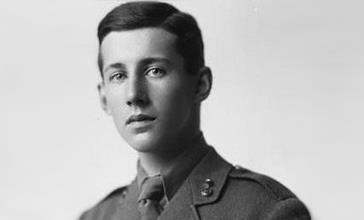31 August 2018
New Forest First World War hero remembered

Geoffrey fought in almost every major British battle on the Western Front from 1916 to 1918, receiving the Military Cross for his bravery, before dying in the last months of the war. Learn more about his story, as part of the Road to Peace project.
To mark the end of the First World War Centenary, the Commonwealth War Graves Commission (CWGC) has launched its “Road to Peace” project.
- The Commonwealth War Graves Commission is marking the end of the First World War Centenary with 120 personal stories of those who made the ultimate sacrifice in the last months of the war.
- The CWGC commemorates a staggering 120,000 men and women who died between 8 August and 11 November 1918.
- The stories have been compiled by the CWCG’s team of historians and includes the remarkable account of Captain Geoffrey Bowen, a First World War hero from Burley, New Forest, who died on 2 September 1918.
Geoffrey fought in almost every major British battle on the Western Front from 1916 to 1918, receiving the Military Cross for his bravery, before dying in the last months of the war.
In 1915, Geoffrey, aged 20, volunteered to join the army and received a commission in the 2nd Battalion, Lancashire Fusiliers.
He fought on the first day of the Battle of the Somme on 1 July 1916, often referred to as the worst day in the British Army’s history with over 19,000 casualties. Here he narrowly avoided death when more than 450 of his comrades were killed, wounded or reported missing.
Promoted to Captain, Geoffrey fought in the Battle of Arras in 1917. Beginning in the snow on 9 April, this was known as one of the hardest-fought battles of the war, with a higher average daily casualty rate than any other. Here he was awarded a Military Cross for his remarkable bravery. The citation for his Military Cross read: “He led his company with great skill and courage. On four separate occasions he advanced his company and had to dig in on new lines. His personal example was of the utmost value to his men under very trying conditions”.
He then fought in the Third Battle of Ypres in 1917, known as Passchendaele. Often fought in thick mud, images of the Belgian battlefields became synonymous with the horror of the First World War.
By 1918 Geoffrey was a seasoned soldier. On 2 September 1918, the 2nd Battalion Lancashire Fusiliers took part in an attack on a German strong point, between the French towns of Drocourt and Quéant. Despite the strength of the German defences, Geoffrey’s battalion advanced and took the German occupied village of Etaing, capturing more than 450 prisoners. There were 30 casualties in the attack, among them Geoffrey. He died aged 23, only a few weeks before the armistice was signed on 11 November.
Geoffrey was laid to rest in the CWGC Windmill British Cemetery. Upon his headstone are inscribed the words “Their bodies are buried in peace, but their name liveth for evermore”.
From famous casualties like war poet Wilfred Owen, through to relatively unknown individuals; from those dying in battle to those who died of Spanish Flu; each story has been carefully chosen to shine a light on the human stories on the costly Road to Peace.
CWGC Historian, Max Dutton, explained: “Behind every one of our headstones or names on a memorial to the missing, is a human story just waiting to be told. Our 100 days “Road to Peace” campaign will remind people of the human cost of the Great War, the sheer diversity of those who took part and the global nature of that sacrifice and remembrance today. We hope Geoffrey’s story will inspire people to find out more about him and his comrades commemorated by the CWGC and visit their graves and memorials”.
From 8 August – the 100th anniversary of the Allied victory at the Battle of Amiens – the “Road to Peace” campaign will conclude on 11 November with the stories of 11 people who died on the very last day of the First World War, even as the guns fell silent. The “100 Days” is a term applied to the final period of the First World War, during which the Allies launched a series of offensives on the Western Front that ultimately led to peace. Not actually 100 calendar days, the term is a reference to the final period of the Napoleonic Wars.
The Road to Peace stories will be shared across the CWGC’s digital channels on Facebook, Twitter and Instagram. A story will appear every day – with a more in-depth feature appearing weekly.

